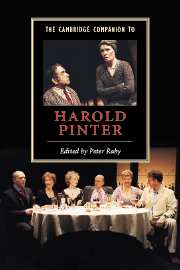1 - Pinter, politics and postmodernism (1)
from Part 1 - Text and context
Published online by Cambridge University Press: 28 May 2006
Summary
Pinter's plays have fascinated many people over the years for many reasons, not the least of which is their capacity to resist large-scale generalisation. The emphasis in the plays on complex and diverse local detail makes it very difficult to argue that the plays as a group exemplify the large general truths of any existing theory about the nature of society, personality, culture, spirituality, anthropology, history or anything else of similar scope. This is not to say that insights into the plays cannot be derived from all these sources. Indeed they can, as several astute Pinter critics have demonstrated. The trouble is that these various perspectives serve best as ways into the texture of the plays rather than as summations of the implications of that texture, and if excessively relied upon, they begin to obscure what they seek to clarify.
Stoppard uses an illuminating phrase to characterise the baffling experiences of the leading characters in Rosencrantz and Guildenstern are Dead when he describes them as constantly being intrigued without ever quite being enlightened. That sense of being fascinated by something we do not fully understand is, as Van Laan has argued, an irreducible aspect of the experience of Pinter’s plays, and we have, I think, over the years come to recognize that the role of the critic is to increase the sense of enlightenment without diminishing the sense of intrigue.
- Type
- Chapter
- Information
- The Cambridge Companion to Harold Pinter , pp. 7 - 27Publisher: Cambridge University PressPrint publication year: 2001
- 6
- Cited by



